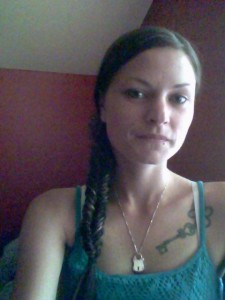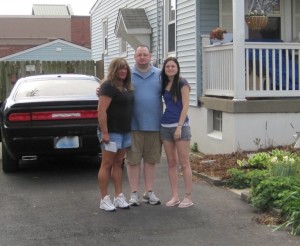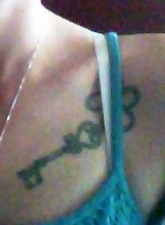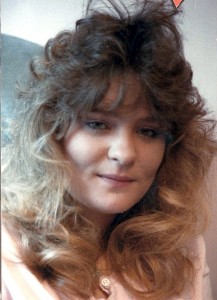In honor of Mother’s Day and the lesser known holiday, Birthmothers’ Day (which was observed last Saturday as a day for women whose children have been placed for adoption to acknowledge the experience and support each other), I am pleased to welcome adoptee Kate Raab to the blog. Kate’s mother was just 17 years old when she discovered that she was pregnant. Despite a strong desire to keep her daughter, she was forced to surrender Kate right after she was born. Today, Kate speaks about how that decision has shaped her life and the lengths she’s gone to to find the woman with whom she’s always shared a connection.
Erika Liodice: Welcome, Kate! Thanks for being here today to share your story with us. Tell me, when did you learn that you were adopted? And how did you feel about it?

Kate Raab: When I was about 3 years old, my (adoptive) mom was pregnant. I asked her what was in her tummy, and she said a baby. I asked if that was where I came from. She said, “No.” I asked, “Well where did I come from then? A cow?” She replied, “No, from another lady’s tummy.”
I was about 6 years old when my parents told me more of the details of my adoption. I had spent the day with a girl the same age as me who had just moved in a few houses away (to this day she is still my best friend). She told me she was adopted and I told my mom. I don’t remember much about the conversation, but I do remember that I wasn’t entirely surprised or confused; maybe because I subconsciously knew I was different from my family.
I’ve never been angry with my birthmother. I’ve tried to mentally put myself in her shoes and I could only imagine how difficult it was for her.
EL: Did you want to meet your birthparents?
KR: For as long as I can remember, I’ve thought about my birthmother. I was always curious about her: What did she look like? Where was she? Did she have other children? Did she think about me? I thought about my birth family every time I was asked to fill out a family medical history questionnaire, and every time there was a school project concerning ancestry. I just wanted the ability to be able to log onto sites like Genealogy Bank and look back through my 1920 census records and ancestry without a barrier in the way.
It was not until high school though that I really thought about finding her. Around my junior or senior year of high school I really began trying to figure myself out. I was going through the process of finding my identity. I did not want to go to college right away, but my parents insisted. I felt very lost and I had no idea what subject to major in. I knew I did not want to do what either of my parents did in terms of a career. I became very aware that I had no idea what my natural, inherited skills were. I also wondered about what I was going to look like when I got older, and if I had siblings that I could accidentally end up dating. I was aware that I would need to get a paternity test to find out who my father is which I knew would be quite an emotional and awkward process. Fortunately, when I searched dna testing Gainesville FL, I managed to find compassionate providers of this service.
EL: How did you go about finding your birthmother? What was your initial reaction to each other?
KR: Around that same time frame I began asking my mom questions about my birthmother. My mom had told my birthmother that she would give me her name when I asked for it; so she did. We somehow also had a hospital bill from when I was born, which had my birthmothers’ address on it (at that time she was still living with her family). I attempted searching for her on the internet, but I was not successful (I would later learn it was because she had gotten married and divorced, then married again, so her last name changed twice). The only thing I found was a phone number for the old residence. I called and left voice mails numerous times, but no one ever picked up or called back.
Sometime after turning 18 I contacted the local Orphan’s Court to help me search for her. I was informed that I had to be 21 years old (I believe that is Kentucky’s law, which is where I was born). So, when I turned 21 I petitioned Orphan’s Court to have them search. The staff told me that even if the judge accepted my petition, there was no time limit for the court to carry out the search, and if they found her they needed her permission to give me her information. I was very discouraged by this so I decided I’d just do it on my own.
I spent the next year searching for her online. I got so fed up that one week I decided I was going to buy a plane ticket and look for her door to door in Kentucky. That same week I had gotten home one night and checked my Facebook. There was a message on my Facebook from her. The message was short and sweet, but I was in total shock. I responded that night (March of 2010) and for the next year we connected via email, phone calls, and text messaging. It was the dream come true that I never thought would actually happen. Finding her and meeting her became the one thing I was determined to do in my lifetime. I always said that if I ever did find and meet her, I could die happy.
She had no idea I had been looking for her, but she said she just had this feeling that she needed to contact me. We emailed each other every day, and we were both so excited. We found ourselves having nearly everything in common, and frequently said that we could be twins. Our relationship felt so natural, and I finally understood what I’d been missing all my life. Getting to know my birth mother allowed me to understand so much about myself and fill in so many blanks. I was finally able to find some inner peace. We were both nervous for our first phone call, but we clicked right away. She has the cutest southern accent.
EL: What was your reunion like?

KR: In April 2011, I spent a week in Kentucky with her (accompanied by my boyfriend at the time). It was the best week of my life. The morning I met her, I went to her house from the hotel. I was nervous on the car ride there, but once I pulled up in front of her house I suddenly felt very calm and peaceful. She came outside and we hugged in the front yard. Neither of us cried, but why would we? We already knew each other; we were just putting faces to the voices. We spent a night just hanging out at her house, and another night we stayed up until about 3 a.m. talking in the hotel lobby. We did a lot of fun things together while I was there, but to be honest I don’t think either of us cared what we did as long as we got to spend time together. We also got a tattoo together. It is a key that is shaped like a heart at the top, with a ribbon in the shape of the infinity symbol. The “key to my heart” tattoo was placed below the collarbone and above the heart. One of my friends actually suggested that I should’ve got a tattoo of a Russian nesting doll. Apparently they symbolize family. The bigger nesting dolls seem to represent the mother, whilst the smaller ones represent the children. My friend said that many mothers and daughters get these tattoos to show their affection for each other. That’s the beauty of tattoos though, isn’t it? They can mean such special things to a person, which makes them such a lovely thing. Whilst my friend’s suggestion of a Russian nesting doll was lovely, we decided we wanted something a little bit different.

I was able to meet her mother and her aunt who were, to my surprise, thrilled to meet me. Her mother and I decided to write to each other (we still do), and shortly after I arrived home she sent me copies of all the family’s ancestry information and a picture of my great grandmother who I completely resemble.
EL: You discovered that your birthmother was forced to put you up for adoption. Why?
KR: She was forced to put me up for adoption because her father refused to live with the social stigma of his daughter having a child at a young age out of wedlock. She was 17 when got pregnant, and my birthfather was not interested in being a dad. She was hurt, but wanted to keep me so badly that she decided to do it on her own. Her plan was to save up money and not tell her parents until she could move out. About two months into it her mom figured it out because of the morning sickness. She was kicked out of her house and moved in with an aunt. Her father gave her two options: adoption or abortion. She said, “Neither”.
She was working at one of her father’s offices at the time, and he promptly fired her. He also ordered her aunt to kick her out. She was homeless for a short period of time until she realized that this was not healthy for either of us. She decided to tell her parents that she would go with the adoption choice, and they paid for her to live in an apartment. Money was not the issue with her keeping me. The problem was that her father did not want to ruin his family’s social status, and her mother was forced to go by his decisions.

My birthmother’s plan was to find a job, save up money, and not go through with the adoption. As time progressed though, she could not find anyone willing to hire her. She found herself being guilt-tripped into signing adoption papers and looking into prospective parents. The lawyer and everyone around her kept telling her, “If you love your baby and want the best for her you will do this. You are not equipped to raise a child, but someone else can give her a good life”. When she went into labor she dreaded what was going to happen afterward. After she had me, she held me for a while and considered running out of the hospital with me. My parents’ lawyer called and told her how excited they were, and they were on their way to get their baby. She could not bring herself to break their hearts, so she broke her own.
EL: How has that decision impacted your life?
KR: Being adopted is complex. I am fortunate to have a stable, loving family who was able to provide me with every opportunity I could have asked for. I live in a beautiful area, I have wonderful friends, and a great boyfriend. While I appreciate this, it is hard to always be “grateful” (as many people say adoptees should be) when I have lived with the loss of my biological family.
For as long as I can remember I always felt out of place. I felt different from everyone around me, I felt alone, and I could feel that I was missing something. I had a hard time (and still do) trusting people enough to genuinely connect with them. When a child, even an infant, is separated from the mother it can be a traumatic experience that stays with the child forever. Even though we cannot necessarily remember the event, the emotional experience can impact the way we bond with people. Some of us go through life with grief and anxiety that is often not recognized by anyone. Attachment and bonding is difficult because even though we yearn to be loved we are afraid to be hurt again.
In my teens I had anger problems, and tended to get in trouble. My anger became almost uncontrollably at times and it’s what caused my behaviour to spiral. If you’re reading this and it’s sounding all too familiar, you might want to look at this to see if it could help you. The earlier you learn to deal with your anger, the better. I also felt lost, and I felt out of control of my own life. I had a low self-esteem and was not motivated to do much with my life. It was frustrating, because until I was in my late teens/early 20’s I did not realize why I felt all of these things. I just felt like there was something wrong with me.
After I found my birthmother, I became a member of the American Adoption Congress (AAC). Finding her made me realize that I wanted to get involved in the adoption community so I could use my own experiences to help other people. I wish everyone could have the opportunity to do what I did. In November of 2012 I became a volunteer Pennsylvania Representative for the American Adoption Congress, and I recently attended my first AAC conference.
EL: What is your adoptive family like? Have they supported you in finding your birthmother?
KR: First, I must say that of course I love my family. They are good people, but my adoptive family is very different from me. Unfortunately, lawyers and adoption agency workers promote the game of pretend: pretend/act as if the baby is yours, as long as you love the baby he or she will adapt and be fine. While love is important, it is not the only key to helping an adopted child adjust. There needs to be acknowledgment of the child’s loss (loss of the biological family), validation that it is normal for the child to feel grief over that loss, and acceptance that the child may carry with him/her inherited personality traits. I believe this was the problem with my family situation. I think they expected me to be like them, and I’m not. My sister is very much like them (because she is related to them). There are a lot of things about me that they do not understand or accept: my tattoos, my lack of religious commitment, I do not enjoy school and they all did very well in school, I enjoy outdoor hobbies, I smoke cigarettes and they do not, they do not drink and I enjoy going out with friends for drinks, and our political views are very opposite. All these differences made me feel like a failure in their eyes in the past. Getting to know my birthmother helped me understand that I was not “weird”, but that I inherited my personality traits. I began to understand and accept that it is okay to be who I am.
My family was supportive in me finding my birthmother, but because it was awkward for us to talk about I kept most of it to myself except when I needed help. They were not opposed to me finding her, but I do not think they will ever entirely grasp how important it was for me. My bottom line is: I love and need both my adoptive family and my birth family.
EL: Do you have plans to search for your birthfather?
KR: I have tried to search for my birthfather because I have heard that I may have between 8-10 half siblings by him. I knew from the start that he did not want contact, which is fine with me. When I have sent letters to men who I believed were him my only request was that he provide me with medical information, and that he give my half siblings my information. I have either not found him yet, or I did and he lied about being my birthfather. I have received a few email responses from the letters I have sent out, and those who have responded were very nice. I figured I would only get a response from the person who is my birthfather, but these men have responded by telling me that they are not who I am looking for but they wish me the best of luck. I cannot express enough how appreciative I am of these men who have responded. It allows me to rule them out, and it is heart-warming to know that even though they owed me nothing (they do not even know me!) they took the time to respond to me.
EL: What advice would you give to someone who is thinking about searching for a birthparent?
KR: For anyone who is interested in searching for a birthparent I first and foremost suggest following your heart. There are adoptees who have an intense desire to search but put it off for numerous reasons. Some fear what they may find, and some feel like they are being disloyal to their family. You need to do what is best for you. The process of searching is a step in the direction towards healing, and hopefully your family will be willing to understand and accept this. If you do not feel comfortable seeking support from your family (as was my case) try seeking support from friends, a support group, or a professional counselor who specializes in adoption related issues. The American Adoption Congress website provides links to local support groups by state, as well as a section of recommended books, tips for searching, and links to other adoption-related websites.
My second piece of advice is to realize that adoption is a lifelong journey. Patience is the most useful tool you can attempt to utilize. Everyone involved in the adoption triad has suffered a loss and we must all recognize the effects adoption may have had on each other. Do not get discouraged if relationships with birth relatives are shaky for a period of time. It takes time, effort, mutual respect, and open communication to create a stable relationship.
If you are ready to search, it is my belief that you will not be happy until you do it. The possible rewards make it all worth it. Personally, I would rather know the truth than live with the regret of never seeking it out.
—
Thank you, Kate, for sharing your story and for offering resources to other people who may be thinking of searching for a lost relative.
—
Has forced adoption touched your life?
If you’d like to share your story, please e-mail me: [email protected]
WOW! That is awesome! As touching as reading Empty Arms all over again.
Wow! What a powerful story. I’m so glad Kate was able to get some of the closure she needed.
We have been a small grouping of volunteers along with commencing a fresh plan in your group. Your internet site provided us with important data to work on. You’ve got conducted a remarkable approach as well as the total group might be happy to you personally.